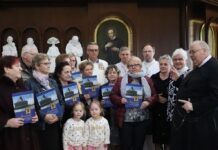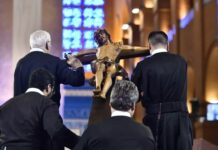Introduction
The XXV General Chapter took place in Pattaya (Thailand) and concluded at the end of November 2016. At the beginning of its massage to the Congregation we read these words: “we have no right to proclaim Jesus as our Lord and God if we do not touch his wounds”. This quotation is taken from one of the conferences given by Cardinal Luis Antonio Tagle, Archbishop of Manila, to the chapter members during the retreat he preached at the beginning of the chapter.
The Chapter Message is divided into eight sections, each with its own title. The Center for Redemptorist Spirituality proposes that these section titles will become the themes for 2017 One Body issues. The very first section of the message is entitled Attentive to the Wounds of the World.
Solidary with the wounded world
An accurate observer of today’s world can easily notice that, besides experiencing tremendous progress and advanced technology, this world is also experiencing suffering and pain. The wounds of the world are to be noticed in many areas: politics, families, life of single persons, ecology – and the Church is not free from these wounds either.
As missionaries, we are invited to answer the cry of the wounded world by our solidarity with it. This is a very inspiring statement, but at the same a very risky one! In order to be in solidary with the suffering world, we have to avoid any kind of idyllic imagination which could lead us to conclusions that would be unrealistic and pathetic. How many times great ideas have ended in illusion and, instead of being an inspiration, became a tragic disappointment. Solidarity must be real and tangible.
How many of our people, confreres and lay partners, feel wounded by the difficulties they have had to face, or simply by dissatisfaction and awareness of their own poverty? How can these wounds be healed? Is it possible? Who can do it?
In chapter 20 of the Gospel of John we can read the story of Thomas, who was healed from his incredulity by a very tough and dramatic therapy. The Lord makes him touch the wounds made by His torture and crucifixion. For sure it was not a pleasant therapy, but it ended with one of the most beautiful confessions that the Bible offers: My Lord and my God.
Would Thomas be able to make such a confession if he did not touch the Lord’s wounds? We do not know, but in our minds arises the conviction that it was exactly by touching the wounds of the Risen Lord that he became a believer.
Today, the Lord is present in all those places and people that are wounded. Only if we recognize Him there we will be able to understand the depth of that mystery: we touch the wounds of Jesus in those who suffer today. It is also true that in such a way we will encounter the healing of our own wounds (1Pt 2, 24).
There are no “ready solutions” for the wounded world. Sometimes we are tempted to apply our own methods and means to realities that cannot be healed by us. First of all, we should develop the attitude of an attentive listening without interrupting. Listening to God is our first task. He speaks to us, and it is He who heals the wounds. He might use us to bring healing to those who need it, but it Him who heals. He speaks to the hearts of both those who suffer and those who bring healing.
Let us listen to our confreres in community who are our companions on the journey. There is within us a will to go and reach out to people who are far away, but quite often we forget about our own people who perhaps live in our own communities and are wounded.
Let us listen to the most abandoned, especially the poor to whom we are sent. Let us be challenged and healed by them. Let us bring them help and comfort by listening attentively to their stories. Most of the time we will not be able to change their life materially, but perhaps by listening to them we will bring them back something that will heal them, namely their dignity (cf., C 43).
Many times we hear our missionaries or other church people saying that it is not easy to proclaim Jesus’ gospel today. If we listen to stories of our senior missionaries and read the lives of our saints and blessed (in this month those of saint John Neumann and blessed Peter Donders), we will realize that it was never easy to preach the good news of Jesus Christ.
The wounded people are living in this world as it is today, with its lights and shadows. We can choose to spend our entire lives despising and criticizing today’s secularized world. Or we can take up the challenge and begin to spread the seeds of good news in this apparently “bad” world. If we think that we can bring salvation to the world by ourselves we will always fail, but once we let Jesus work through us, things will start to change (cf., C 51).
How important it is that all our theological reflections, particularly those connected with Moral Theology, be open to a dialogue with this world in which we and others live our lives. It might not be easy to give immediate solutions to many moral and ethical questions, but perhaps this is what our people expect from us the most: to give them direction, to give them support, and to assist them in their struggle not only by our preaching but by being involved in their lives (cf., C 19; 023-024).
The word of God
Let us return to the passage of the Gospel taken from John 20, 24-29. It is a very moving story and, as we have seen, presents Thomas who, from being doubtful, becomes a believer. He becomes a believer because Jesus changed him by allowing him to touch His wounds. The passage ends with one of the most beautiful confession ever made: My Lord and my God.
What does this text say to you both on personal and your community level?
Do you think that perhaps, as Redemptorists, we need an experience like Thomas had, an expereince of touching the real wounds of Jesus? If so, what would be the most realistic way to do it in your life?
Drinking from our own well
In the last month we remembered two our confreres: John Neumann and Peter Donders who, by the testimony of their lives, became examples how to be united with wounds of Christ in our neighbors. They gave their testimony in different ways and in totally different cultures, even though they belonged to the same period in time. Nevertheless both of them shared a common feature: they wanted to give their life to God in a very quiet and ordinary way. Perhaps this is the secret of their “success” in being able to be attentive to the wounds of the world. They let Jesus work through their lives and let Him to make them the instruments of His compassion. Let us listen to short descriptions of their lives and spirituality.
The first passage comes from the decree on the virtues of Saint John Neumann proclaimed by Pope Benedict XV: “The merits of an active man are measured not so much in the number of deeds performed, as in their thoroughness and stability. For true activity does not consist in mere noise; it is not a creature of a day, but it unfolds itself in the present, it is the fruit of the past and should be the good seed of the future. Are not these the very characteristics that mark the activity of Venerable Neumann? Bearing all this in mind, no one will any longer doubt that the simplicity of the work performed by our Venerable Servant of God did not hinder him from becoming a marvelous example of activity”.
The second, concerning blessed Peter Donders, is a short description of his life offered by Fr. Fabriciano Ferrero CSsR: “Still, our blessed Peter is not a flamboyant person. He indeed belongs among the quiet and simple missionaries who, with their heroic virtues and their human limitations, went about building the Christian communities in Latin America. His is not some unique role that impresses us today, but he stands out as an authentic representative of so many men and women who gave the best of themselves to build up the Church of God on the “outskirts of Catholicism”. His biography brings pure torture for anyone who wishes to follow the classical lines of writing history because it is difficult to find anything extraordinary in his personality or in his lowly work. [He was hidden] in the anonymity of a colony alongside others building Christian communities out of simple and radical fidelity to the Gospel in everyday life in the backwaters of the world, of society and of the Church. Figures like Donders merit little attention. In them, what is extraordinary lies in the perfection and heroicity of ordinary life, in perfection of doing all things well”.
Keeping in mind the “quiet” testimony of our confreres, let us entrust our lives and our missionary vocation to Mary, Mother of Jesus. She lived a quiet life but, in this, she was able to reflect and meditate upon what God was performing in Her life. Above all she was attentive to the necessities of others asking Her Son to help those who were in need: do whatever He tells you.
—————————————————————————————————
ONE BODY is a monthly text of prayer proposed by the Center for Redemptorist Spirituality. For more information:
Fr. Piotr Chyla CSsR (Director of the Center for Spirituality – fr.chyla@gmail.com).







